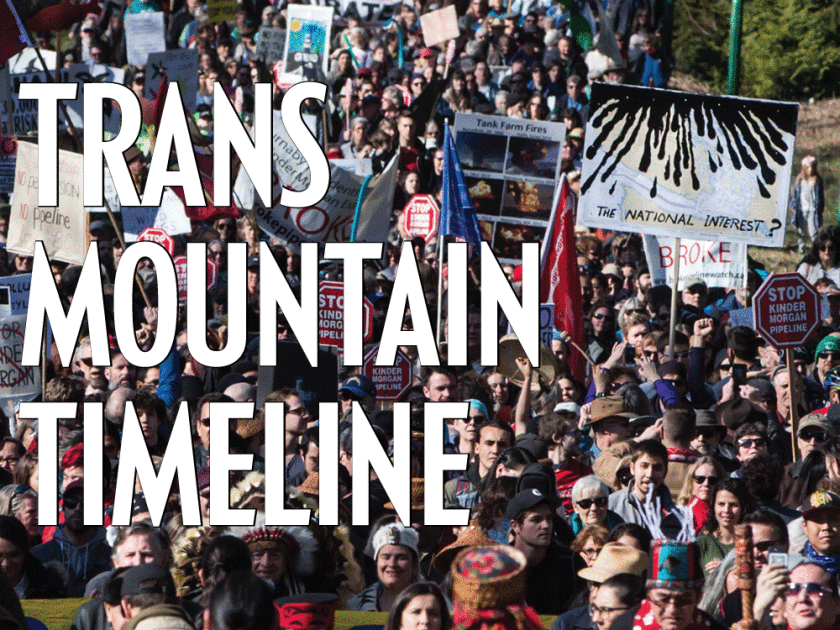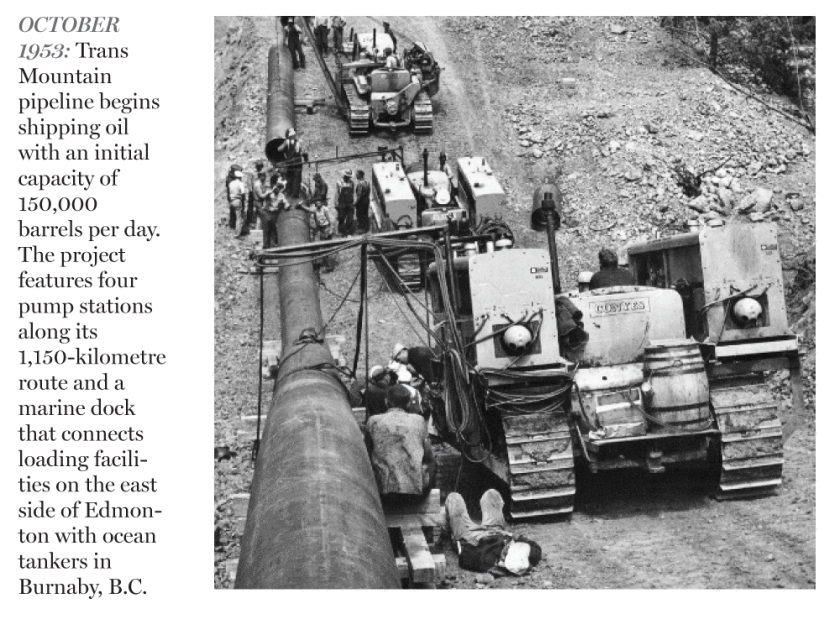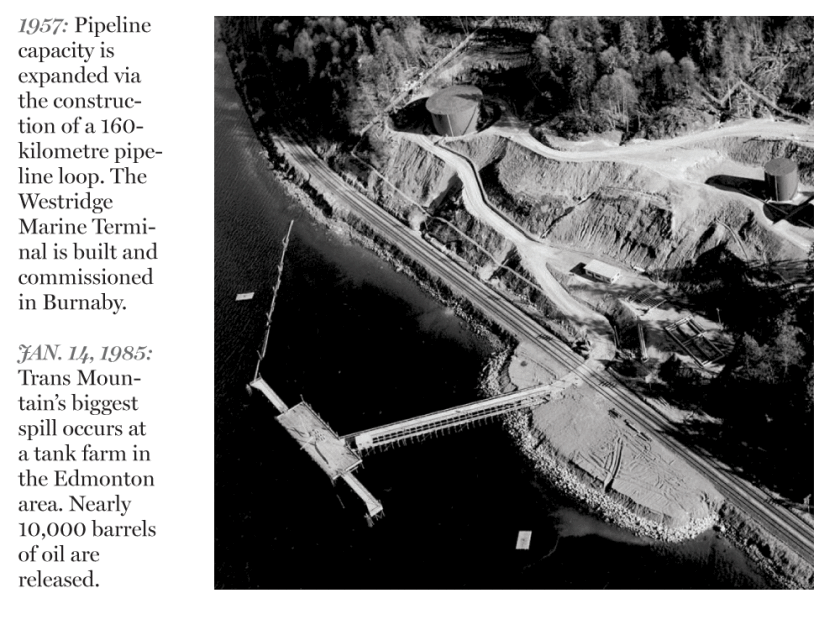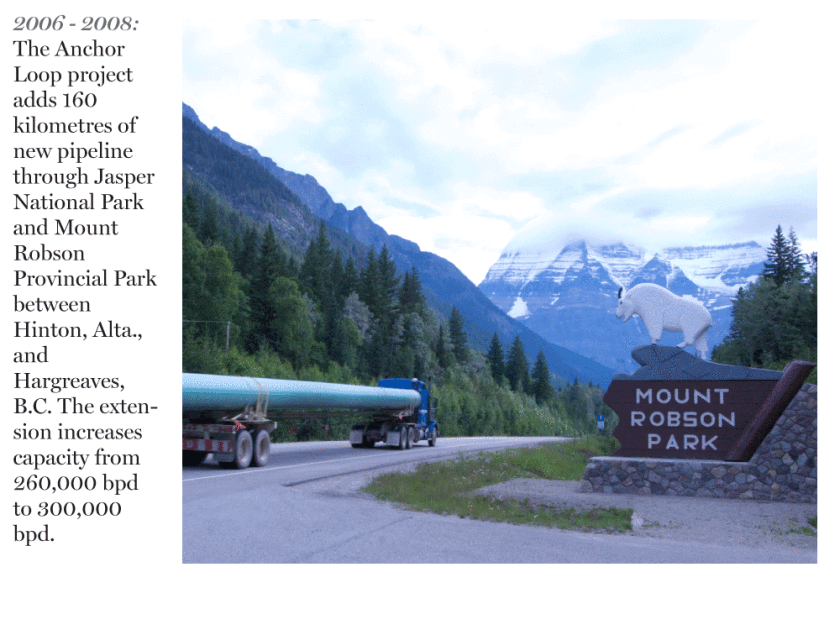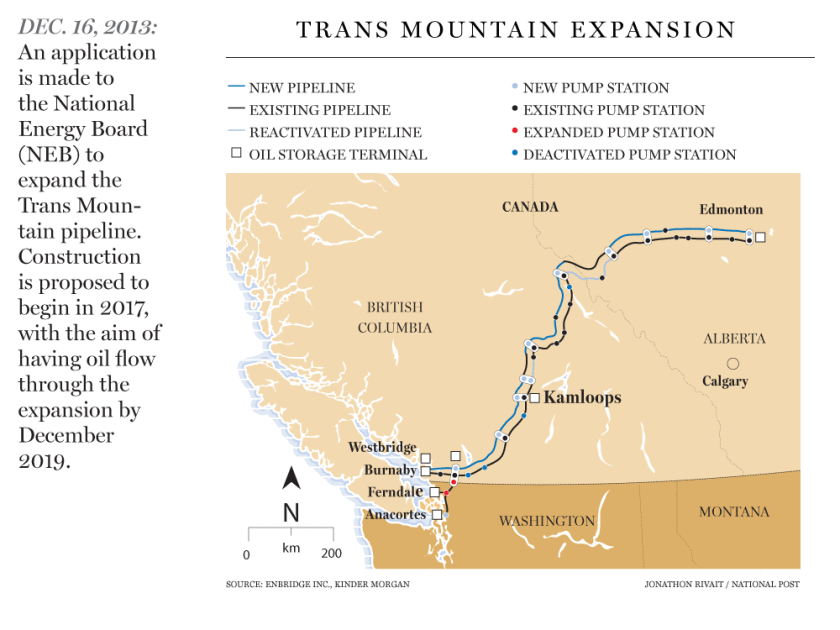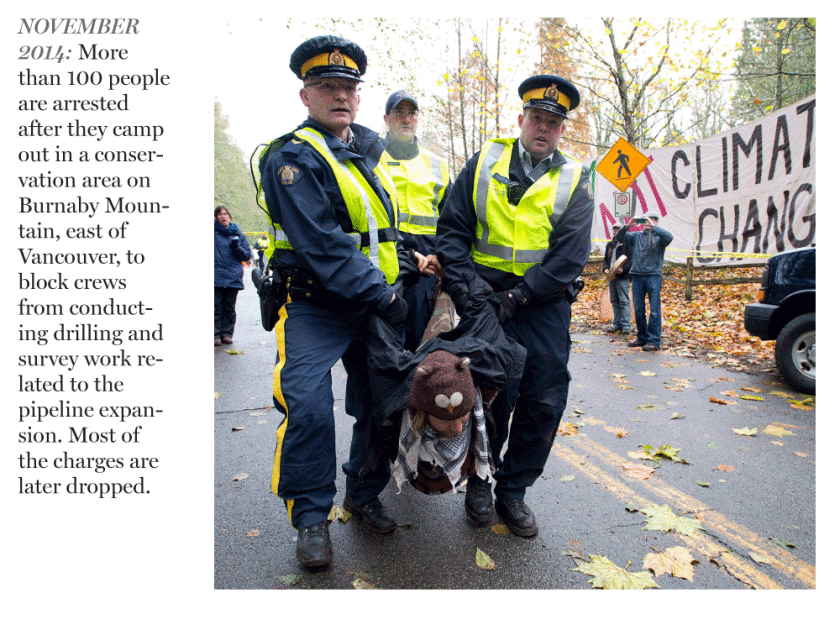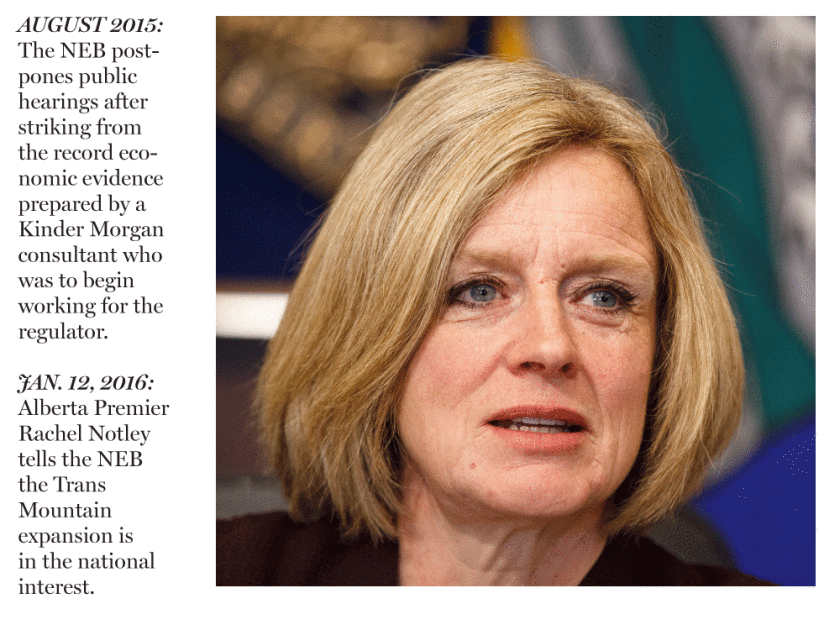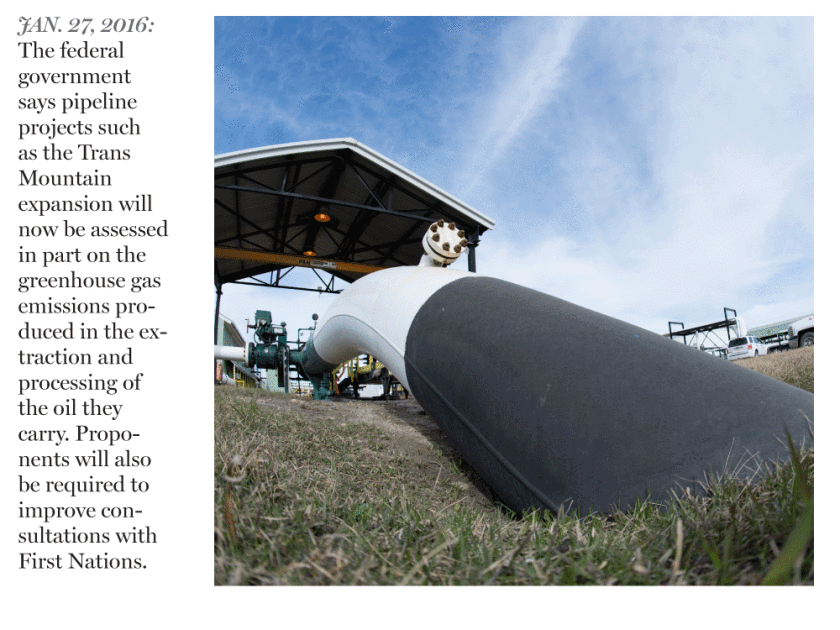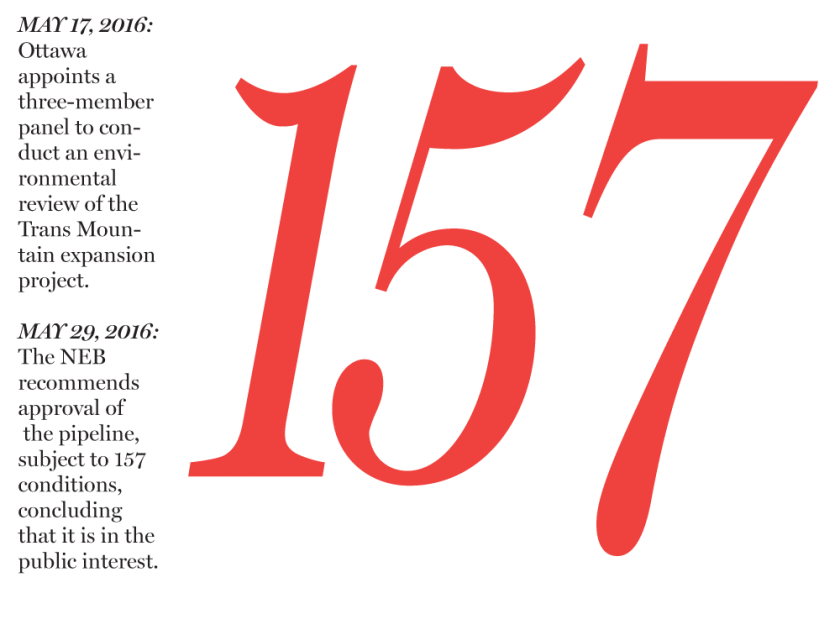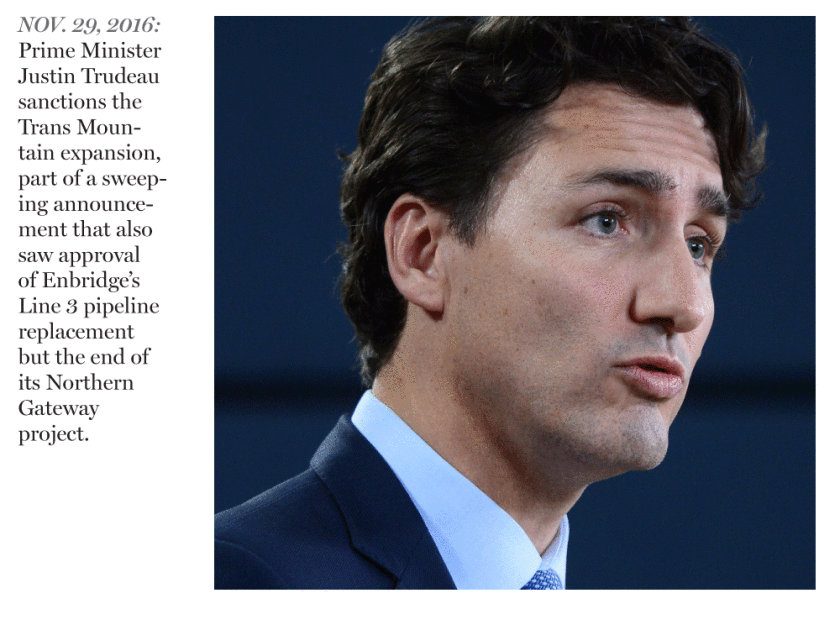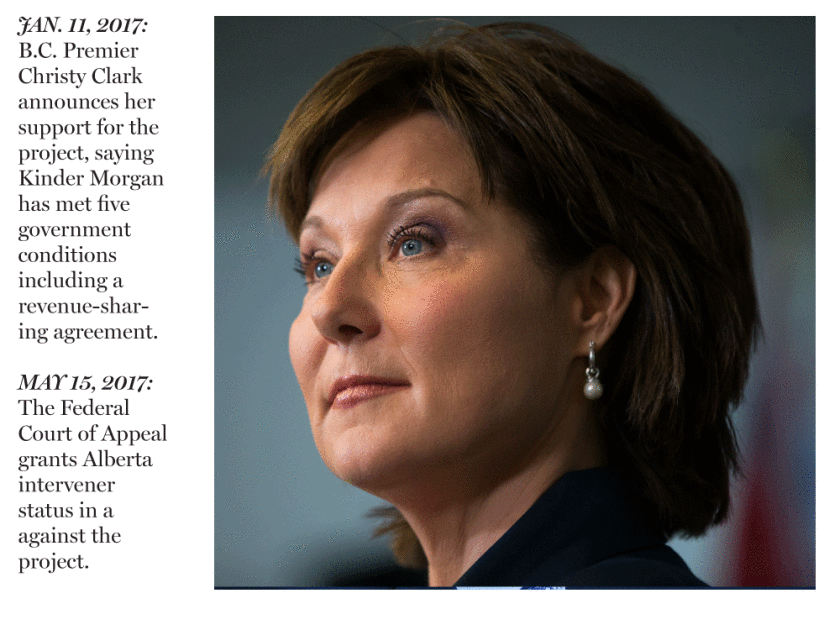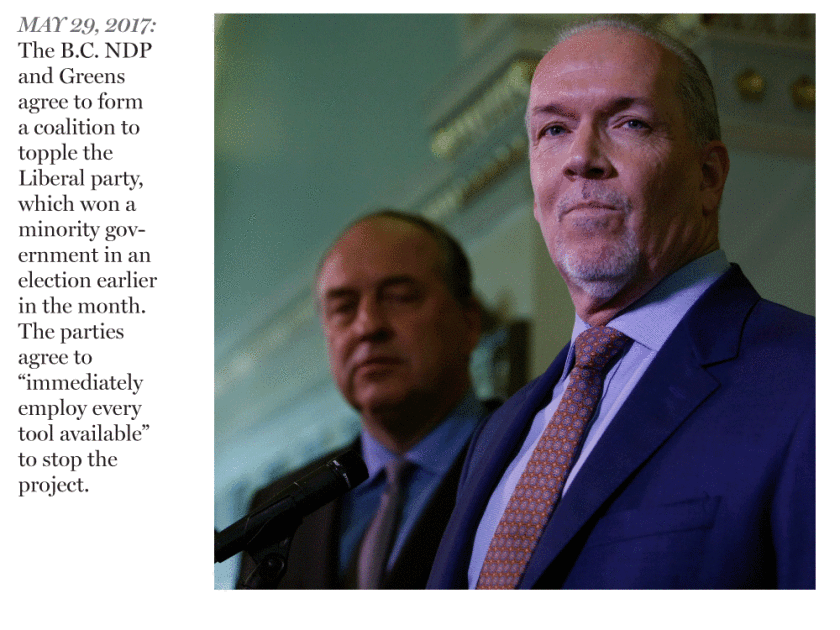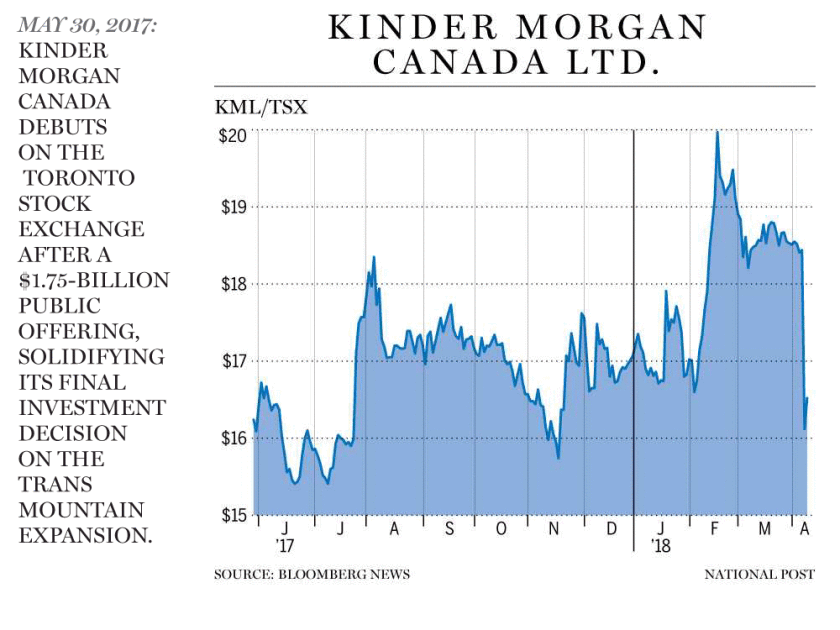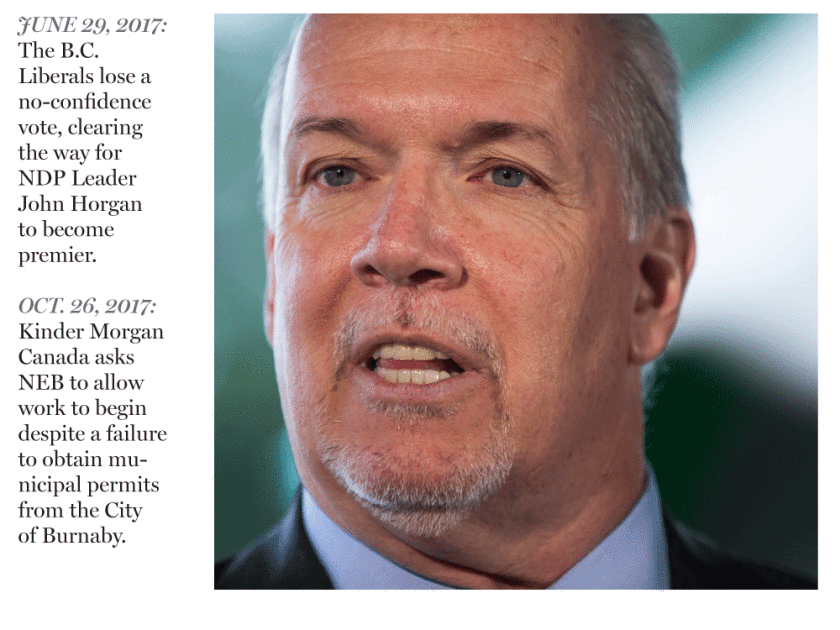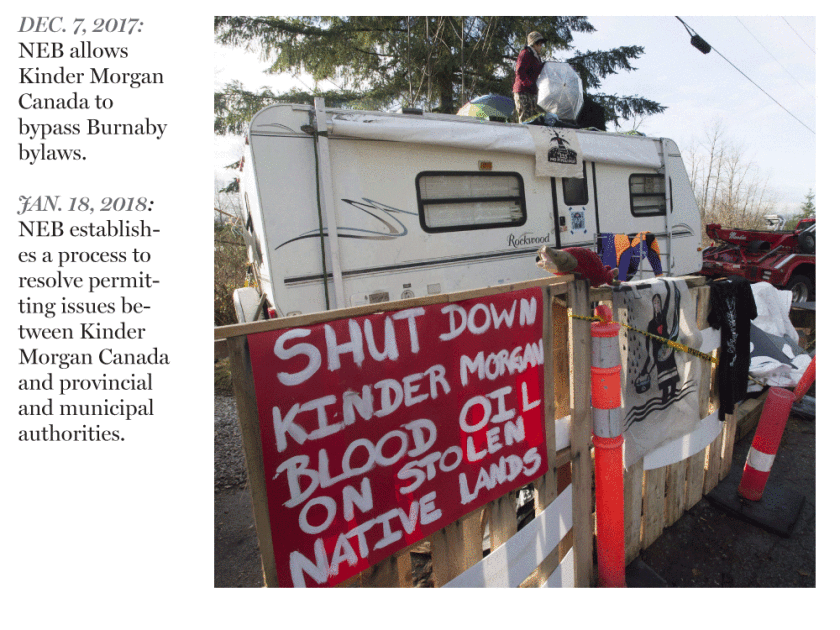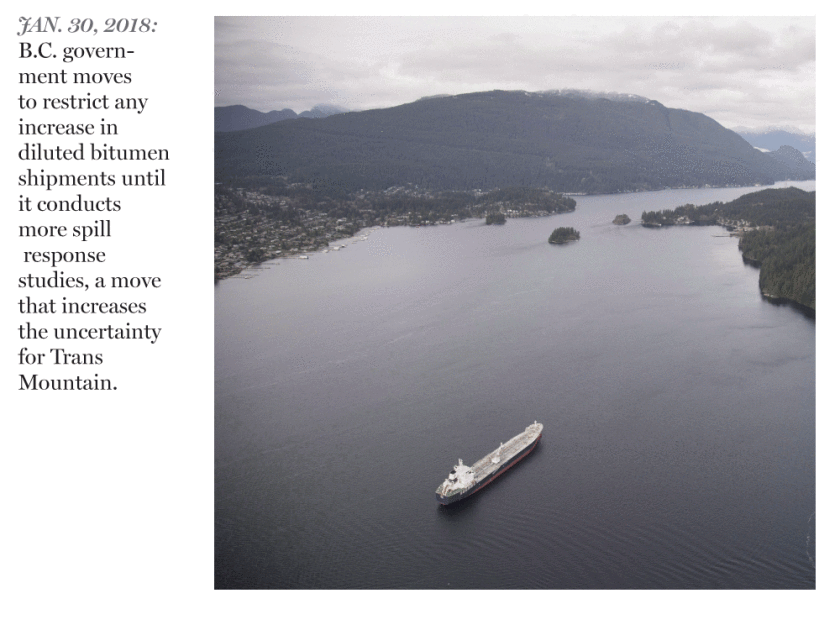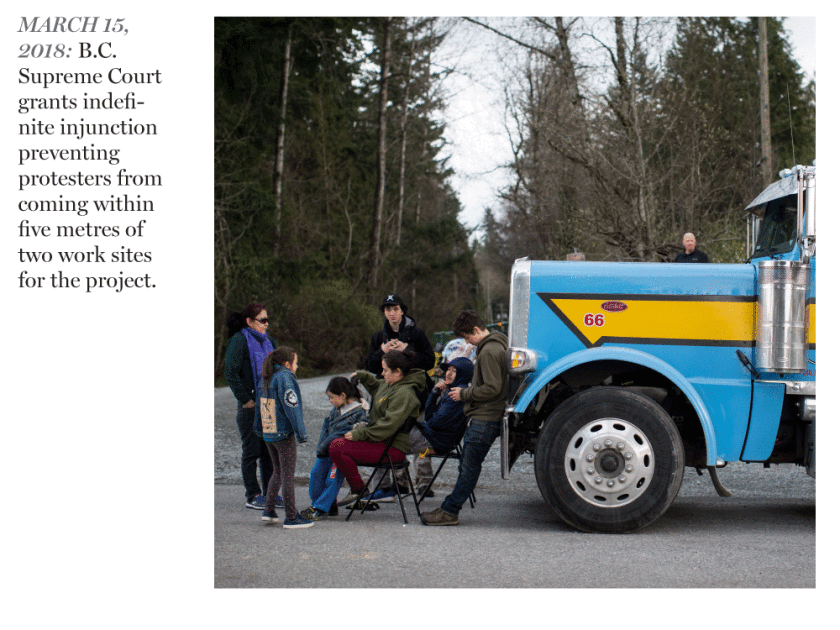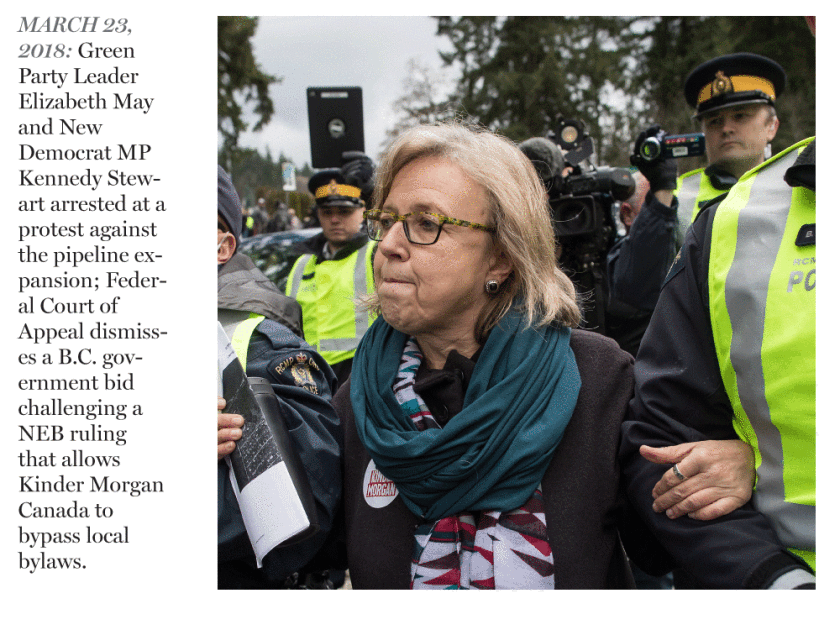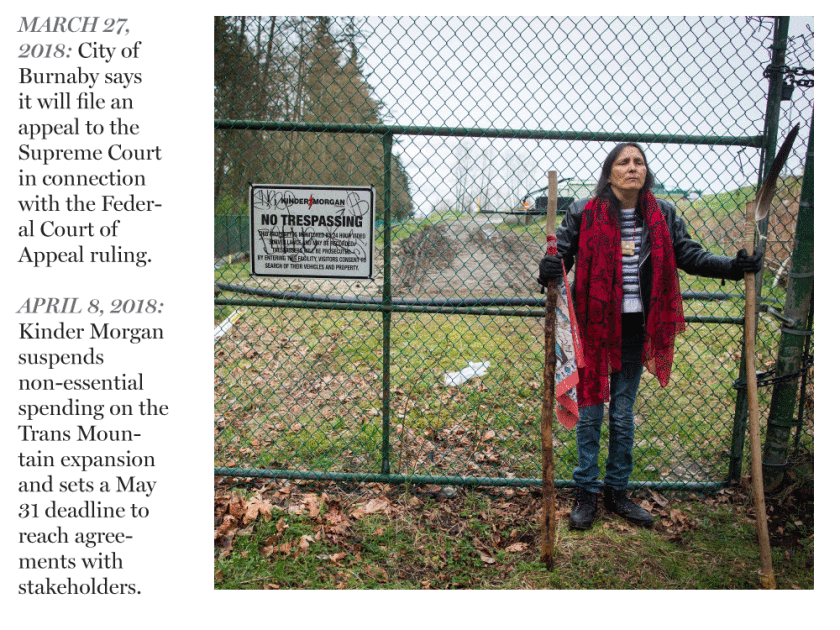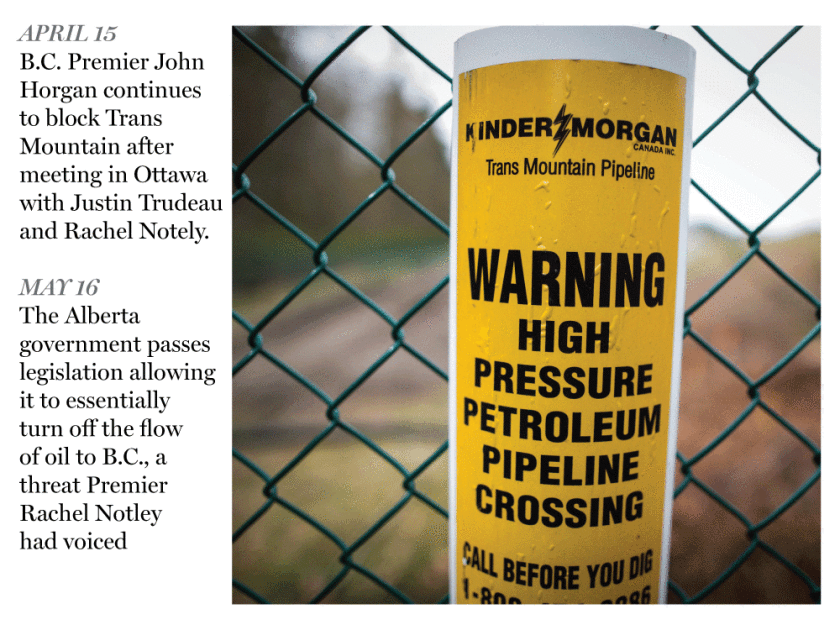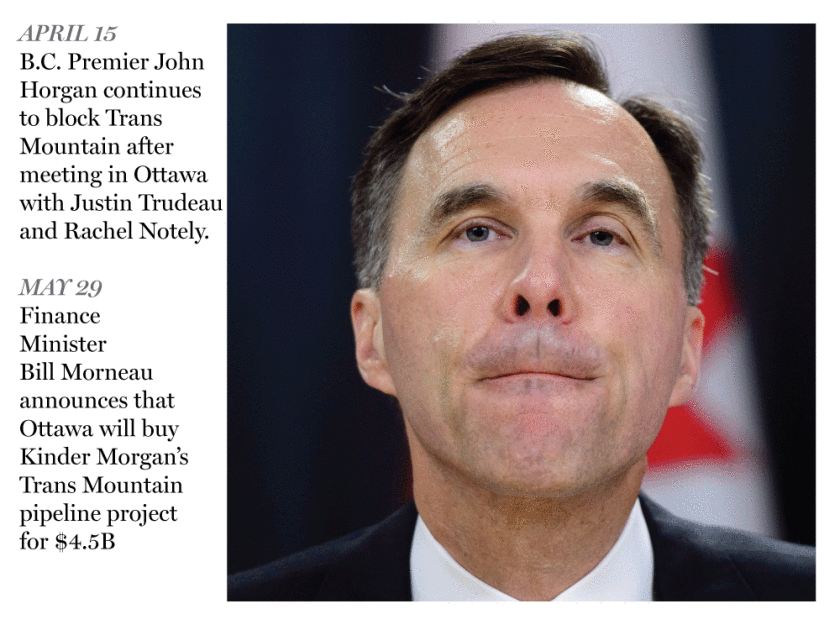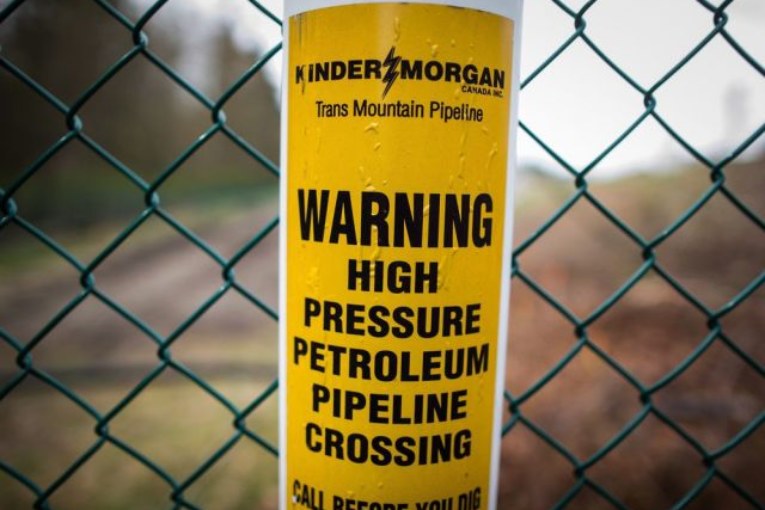
CALGARY – Natural Resources Minister Jim Carr was in New York in early April preparing to give a speech at an investors’ conference when he got a call from Houston.
On the line were Kinder Morgan Inc. chief executive Steve Kean and Kinder Morgan Canada Ltd. president Ian Anderson, who were calling to share how their concerns about the $7.4-billion Trans Mountain pipeline expansion had only grown since Carr last met them in person in Houston a month earlier at the IHS CERAWeek energy conference.
I had known for a while that they were nervous. I didn’t know that they intended to give an ultimatum and a deadline
Natural Resources Minister Jim Carr
Calls from Kinder Morgan weren’t unusual, but this one was different. The executives said Kinder Morgan would be issuing a press release the next day, April 8, to announce the company would suspend all non-essential spending on the proposed pipeline from Alberta to B.C. and give the federal government a May 31 deadline to resolve British Columbia’s opposition to the project.
“I had known for a while that they were nervous. I didn’t know that they intended to give an ultimatum and a deadline,” Carr said in an interview with the Financial Post. “I wasn’t expecting it.”
Kinder Morgan executives placed an identical call to Alberta Premier Rachel Notley, who immediately cancelled her trip to New York where she planned to attend the same Bloomberg New Energy Finance conference as Carr.
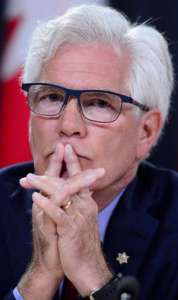
Those phone calls set off a rush of activity in both Edmonton and Ottawa.
Carr and other politicians and bureaucrats rushed from investor conferences in New York and Toronto back to the capitals to prepare for what had just become a national crisis that would dominate the next eight weeks and culminate in a controversial $4.5-billion deal announced Tuesday, with Ottawa purchasing both the Trans Mountain pipeline system and expansion project.
Until that point, senior government officials were never certain a deal would be clinched before the deadline, not even when Finance Minister Bill Morneau called the Calgary Chamber of Commerce on May 24 to schedule a speech to the city’s business community less than a week later on May 29.
But, the Financial Post has found out, in the event that Ottawa didn’t clinch a deal, Alberta’s government had prepared a full contingency plan that included choking off oil shipments to British Columbia in three days and making an offer to buy the project by itself.
Concerns about the viability of building the pipeline had been steadily escalating for months at Kinder Morgan offices in both Calgary and Houston.
“We were increasingly aware of that nervousness and staying in close touch with them,” Carr said of the period leading up to the company’s deadline announcement.
Premier Horgan had no face-to-face meetings with Kinder Morgan in the last year
The company did not respond to requests for comment, but an industry source said the company had been holding meetings with British Columbia’s NDP government to better understand Premier John Horgan’s opposition to the project, especially since Kinder Morgan had previously agreed to pay the province $1 billion to satisfy former premier Christy Clark’s five conditions to approve the project.
“Premier Horgan had no face-to-face meetings with Kinder Morgan in the last year,” said Jen Holmwood, a spokesperson for Horgan. “His chief of staff met with them twice to make British Columbia’s concerns clear.”
The $1-billion agreement signed by Kinder Morgan executives remains in place after the federal government’s purchase of the Trans Mountain system, Finance Canada spokesperson Jocelyn Sweet said in an email.
Although Kinder Morgan’s concerns about B.C.’s opposition were well known, the calls on April 7 to Carr and Notley had an immediate effect.
In Edmonton, the Alberta government engaged a private Calgary-based pipeline consulting company to evaluate the existing line and expansion project, preparing the province to purchase an interest in the line, if it came to that.
“Alberta is prepared to do whatever it takes to get this pipeline built — including taking a public position in the pipeline,” Notley said at the time. “If we take that step, we will be a significantly more determined investor.”
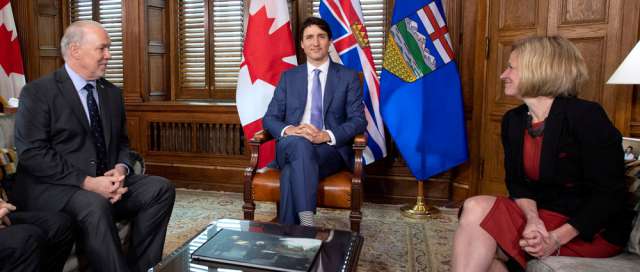
Ottawa’s concern was also escalating. Prime Minister Justin Trudeau cut short his trip to Peru to host a meeting with Notley and Horgan in Ottawa on April 15, which was a turning point in the discussions.
A senior source with direct knowledge of the matter said Notley and Morneau met on April 11 in Toronto ahead of the summit. In addition, the Prime Minister’s Office and Notley’s office had communicated throughout the week before the meeting and both sides had a thorough understanding of the other’s position.
“I can tell you that Notley was well prepared for that meeting,” said Peter Tertzakian, an energy economist and executive director of ARC Energy Research Institute, a division of private-equity giant ARC Financial Corp. Tertzakian is on an Alberta government advisory committee and saw the premier before her departure for Ottawa.
Horgan had a more general idea of what the meeting would entail.
“For this meeting, we had no advance agenda, nor was one provided. The Prime Minister led the discussion,” said Holmwood from Horgan’s office.
The meeting included Horgan, Notley and Trudeau, as well as ministers Carr and Morneau. Horgan said he was concerned about “gaps” in Canada’s $1.5-billion Oceans Protection Plan and was acting to protect his province’s picturesque coastline.
After the meeting concluded, Trudeau tasked Morneau with negotiating directly with Kinder Morgan chief executive Steve Kean and to keep in contact with Notley. At various press conferences, Horgan said he was speaking with the Alberta and federal governments, but it is not likely they were to the same extent that Notley and Morneau were in touch.
“After the meeting with Trudeau and Horgan, there was optimism that the federal government was engaged,” said Cheryl Oates, a spokesperson for Notley.
Oates said the Alberta government was assured at that point that the Trans Mountain project was a priority for the federal government.
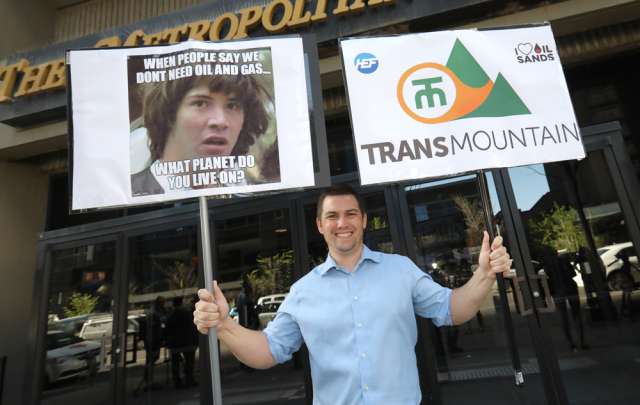
On the same day following their meeting with Horgan, Notley and Morneau held another meeting and agreed that any deal with Kinder Morgan would require the company to commit to immediately restarting its construction schedule.
Part of the reason the federal government led the negotiation, rather than both governments trying to negotiate, was so that Alberta wouldn’t bid up a possible purchase price for Trans Mountain, or vice versa, a source told the Post.
In the weeks that followed, Morneau and Notley met face to face once more, on May 7 in Notley’s office in Edmonton, and then held daily phone conversations until the federal government’s deal was announced.
Morneau went to Houston the same week, beginning May 7, to meet with Kean at Kinder Morgan’s downtown headquarters for in-person negotiations, sources with direct knowledge of the matter said.
There was one more face-to-face meeting between Kean and Morneau at the minister’s regional office on King Street in Toronto and multiple phone conversations, as well as further discussions between government bureaucrats and Kinder Morgan employees.
On May 16, the day of Kinder Morgan Canada’s annual meeting in Calgary, the federal government announced that it would indemnify the company from any further losses on the project incurred due to politically motivated delays.
At that point, Ottawa also indicated that a third-party buyer could be found if Kinder Morgan no longer wanted to proceed with the expansion. “We are willing to indemnify the Trans Mountain expansion against unnecessary delays that are politically motivated,” Morneau said at the time.
At the meeting, hosted in Calgary’s Metropolitan Conference Centre, which happens to be in the same complex as the company’s Canadian head office, Kean emphasized to shareholders that the company would not negotiate in public.
No questions were asked, so both Kean and Anderson were able to disappear behind a black curtain at the front of the room after the meeting — which lasted less than 20 minutes — and ride the elevator up to the company’s office on the 27th floor. Later that day, Kinder Morgan issued a press release saying Moreau’s offer was appreciated, though a deal had not been reached.
But multiple sources confirmed that negotiations dramatically intensified from that day forward.
The public received a glimpse into how those negotiations were going eight days later, on May 24, when the Calgary Chamber of Commerce announced Morneau would be giving a speech in Calgary on May 30.
Interest in the speech was extraordinary and the event sold out in hours. It was then relocated to a larger venue, and sold out again. The chamber confirmed it was concerned about finding a venue that could supply enough food on such short notice.
Many political observers and financial analysts speculated Morneau would not give a speech in the heart of the oilpatch without a deal in hand, but that was not the case.
Morneau — who was scheduled to host G7 finance ministers in Whistler, B.C., the next day — was concerned about the optics of flying over Calgary without providing an update.
“We didn’t feel right flying over Alberta the day before the deadline,” said a senior source present for discussions of the minister’s schedule.
Morneau was preparing speeches to fit three different scenarios. The first scenario was that an agreement had been reached, the second was a total collapse of talks and the third was that the two sides had agreed to talk beyond May 31.
If the talks had collapsed, Alberta would have triggered Plan B, declaring Bill 12 as law and enacting its powers to throttle out-of-province oil shipments within three days.
Alberta would also commence direct negotiations with Kinder Morgan’s Kean to buy the pipeline outright, based on evaluations done by the private consultancy and internal work done by the province’s energy and finance departments.
It didn’t come to that.
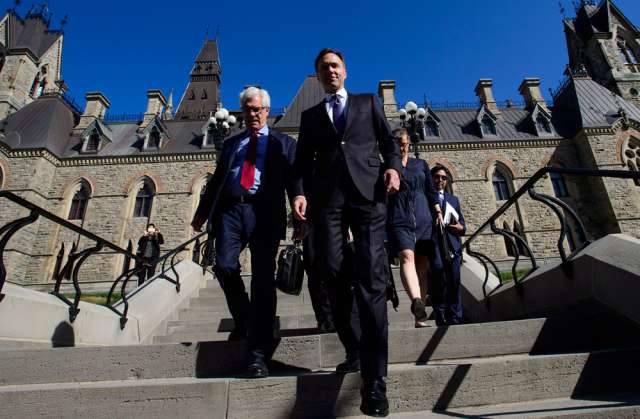
Based on multiple interviews with sources at both levels of government, a deal with Kinder Morgan was reached in the following days and, concurrently, negotiations between Edmonton and Ottawa ramped up.
Notley sent a team to Ottawa to strike a deal. The team included her chief of staff, Nathan Rotman, deputy ministers Colleen Volk and Marcia Nelson, assistant deputy ministers Michael Ekelund and Lowell Epp, and Brian Topp, who left the Alberta government in 2016 but is providing advice to the government at no charge.
The talks culminated in Alberta’s offer to indemnify the project, now owned by Ottawa, for up to $2 billion, which could be immediately converted into equity.
Alberta government staff stayed at the legislature until midnight Monday finalizing the agreement in principle with Ottawa.
The $4.5-billion deal was announced before markets opened Tuesday, May 29.
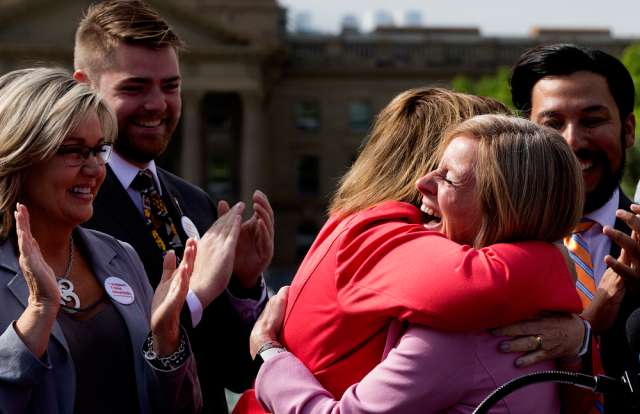
On the morning of May 30, Carr had been sent to Vancouver to give speeches. Morneau, of course, was in Calgary for his Chamber of Commerce speech.
The two swapped provinces the next day, with Morneau heading to Whistler and Carr heading to Edmonton as the federal government promoted the deal.
The reaction in the Calgary was decidedly mixed.
“We have $7.4 billion of private capital evaporating in this country,” said Calgary-Nose Hill MP Michelle Rempel at Morneau’s Chamber of Commerce speech. “What the government has done is signal a fairly radical departure from an investment climate that would allow the attraction of major pieces of foreign direct investment.”
Kinder Morgan Canada shares tumbled for the next three days on the Toronto Stock Exchange as analysts published multiple reports saying the new-look company no longer possessed robust growth opportunities without Trans Mountain.
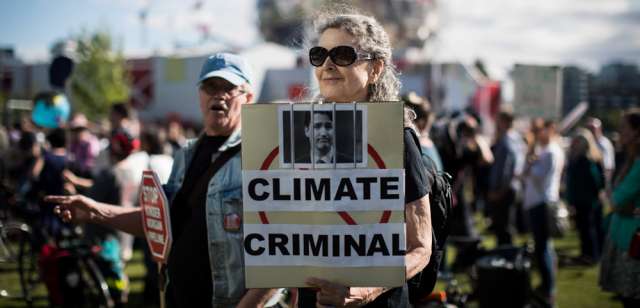
DBRS analysts published a note that said the “residual assets may not be supportive of the BBB (high) rating.”
Oil executives said the deal was necessary, but should never be repeated.
“We can’t do this again and we need to look forward to how we don’t get in this situation again,” Chris Bloomer, Canadian Energy Pipelines Association’s chief executive, said.
Bloomer and other attendees at the chamber meeting said Ottawa’s purchase of the Trans Mountain system was an exceptional circumstance that was necessary to restore business confidence and to provide an economic boost.
“Typically, we would look at it, in an industry like ours, that private investment would pursue development. So for the government to step into this role — and we heard the minister say, ‘It’s not forever, it’s for an interim period’ — I would say it’s an exceptional or unique act,” Imperial Oil Ltd. chief executive Rich Kruger said. “From an industry perspective and from an Imperial Oil perspective, it’s a good thing.”
But others in the city’s financial sector, including Canoe Financial LP director and senior portfolio manager Rafi Tahmazian, expressed concerns that Ottawa had weakened its negotiating position by announcing it wanted to sell the pipeline in short order.
“I don’t agree with that assessment at all,” Morneau said in Calgary, when asked if Ottawa’s negotiating position had deteriorated. “The federal government is enabling the project to move forward by reducing the uncertainty by politics and that’s going to actually increase value,” he said, adding the federal government has already had “expressions of interest.”
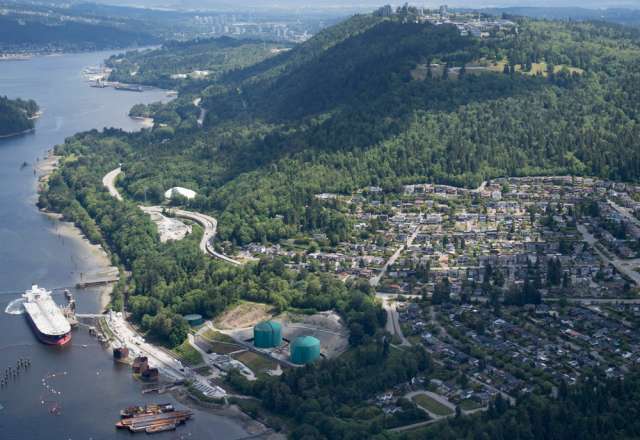
Government officials confirmed Kinder Morgan opened a data room in Calgary in early April for the Alberta and federal government to evaluate the assets as part of the negotiation process and will keep that data room open through the summer to help Ottawa find a third-party buyer.
A few have begun to emerge.
“I made the pitch to several chiefs within Treaty 8 that this is a good opportunity for us to pursue an investment,” said Fort McKay First Nation Chief Jim Boucher.
Fort McKay raised $545 million last year to directly invest in oil storage tanks at Suncor Energy Inc.’s operations near Fort McMurray.
Boucher on Wednesday sent a letter to Morneau expressing interest, on behalf of Fort McKay, in buying into Trans Mountain.
Boucher said he’s met with chiefs in Alberta and B.C. and would continue meeting with more next week to bring together a consortium of investors to purchase a stake in the project.
Other potential buyers have been more guarded. The country’s biggest pipeline companies — Enbridge Inc., TransCanada Corp. and Pembina Pipeline Corp. — have all either said they won’t comment on speculation or refused comment. The Canada Pension Plan Investment Board told Bloomberg News that it’s not looking at the project.
No formal offers have been made and Kinder Morgan’s assistance in keeping its data room open lasts only through the summer, after which point the government will be left to hawk the assets on its own.
You can read more of the news on source

